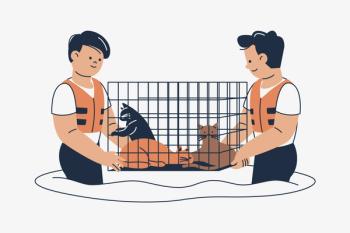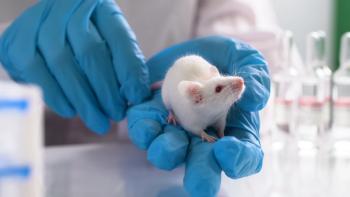
Veterinarians rally to the aid of California wildfire victims
Doctors distribute food, treat burned animals free of charge.
A pair of kittens treated for injuries after the Sept. 12 Valley Fire in Lake County, California. All images courtesy of Dr. Grant Miller.For a man running on four hours of sleep a night for the past week, Grant Miller, DVM, has a lot of energy. “I'm sorry I'm late calling you back,” he says with a laugh. “Things have been crazy.”
A cat burned in the fire and treated by veterinarians who responded to the disaster.Miller is calling from his car, driving through the ashy wasteland that used to be Middletown, California. Life is now divided into before and after September 12, 2015, the day the Valley Fire swept through Lake County. After chewing through 80,000 acres and almost 2,000 structures, killing four people and untold numbers of animals, this fast-moving wildfire now ranks among the worst in California history.
As unit director of the California Veterinary Medical Reserve Corps, Miller was prepared for disaster across the state, but this time it hit close to home. The night of the fire, Miller was in contact with his friend and fellow equine veterinarian Jeff Smith, DVM, who bunkered down in his home in Middletown as the fire roared through.
Stopped at road bloackades, Miller was unable to reach Smith until the next day. “Whenever you take away the infrastructure-power, roads, communication equipment-there are going to be issues in responding,” Miller says. So he sat nearby with a generator and supplies in his car, waiting.
Firestorms are violent and unpredictable, generating their own wind systems that lift embers and disperse them randomly into the distance. Smith emerged from his home to find it was only one of eight houses left standing in his neighborhood. Racing down back roads to avoid getting turned back, Smith arrived at the Middletown Animal Hospital to see it, too, had miraculously survived.
Dr. Jeff Smith's clinic survived the fire, and he is treating victims free of charge.With no immediate help in sight, Smith and a small crew of family and neighbors filled his truck with bales of hay and buckets of water, driving around town and throwing them down whenever they spotted animals. With fencing melted and flames still active, the animals still alive were panicked and scattered.
Miller finally arrived the following morning, driving past hundreds of miles of downed power lines and a scene he can only describe as “apocalyptic.” He pauses as he tries to describe what he saw on the way, the destruction and animal suffering, before deciding he can't put it into words.
When Miller pulled up, Smith had already opened the doors of his clinic to treat any animals who needed it, free of charge. Volunteers from the University of California, Davis, soon arrived to assist in rounding up roaming animals, and the patients came pouring in. First sheep and goats, then dogs and cats. By day 7, horses and cows began to trickle in as well. Smith treated them all.
About an hour away, UC Davis stood ready to assist with the most severely affected animals. “Without the disaster, we never would have gotten this level of collaboration,” Miller says. “UC Davis has taken in over 70 burned animals-mostly cats. They are functioning as a referral center.”
With only 40 percent of the structures in Middletown still standing, Smith's immediate concern was for the long-term welfare of the community. Lake County is California's poorest. “This land is not going to be capable of sustaining animals for a very long time,” Miller says. “They were economically depressed to begin with, now they've lost everything.”
Smith has vowed to remain open to treat all the fire victims without payment. “We're estimating over the next four to six months he will be absorbing the costs,” Miller says. “Burns are not quick fixes. His clinic is going to be the last option remaining when everything else is gone.”
But Miller remains in awe of the community hope remaining. “You can burn a community, but you can't kill a community,” he says. “I do not know how they're going to survive, but people can combine together and make things work.”
As we finish talking, Miller says he needs to call a group from a local Jeep club. “They asked how they could help,” he says, “so I'm making them transport donations.” He has been on the phone all evening. He has no plans to stop; there's still too much work to do. One week in, they are still finding cats huddled in melted cars.
“You see these animals and you know how much they have suffered,” Miller says. “You just want so badly to turn things around for them, and you would move heaven and earth to make it happen.
A dog recovering after its paws were injured in the wildfire.
More than anything, Middletown needs financial donations. All Wells Fargo locations nationwide can receive donations; and a
Dr. Jessica Vogelsang, a certified veterinary journalist, is a regular contributing writer for a number of publications, author of the memoir All Dogs Go to Kevin and creator of the popular blog
Newsletter
From exam room tips to practice management insights, get trusted veterinary news delivered straight to your inbox—subscribe to dvm360.





